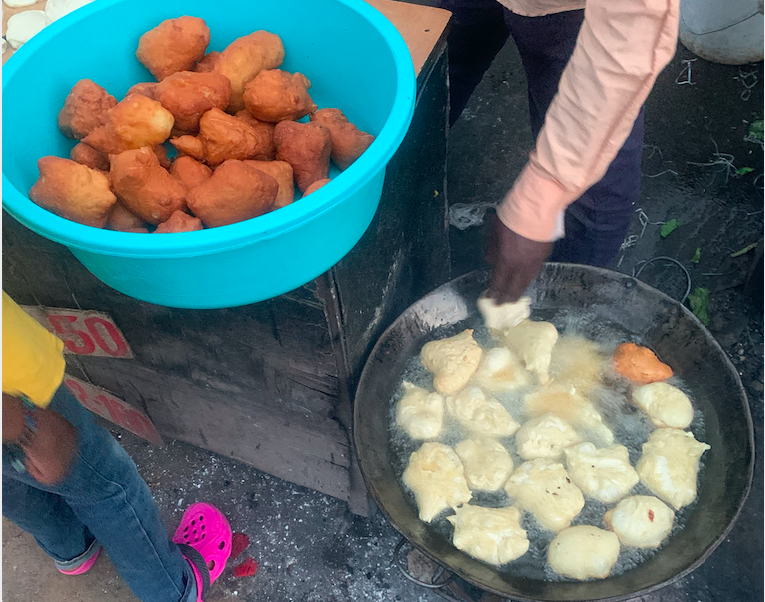 A vendor in Kibra fries mandazi in transformer
oil, a petroleum-based substance
containing harmful chemicals, including polychlorinated biphenyls (PCBs). Photo/ Kevin Githuku.
A vendor in Kibra fries mandazi in transformer
oil, a petroleum-based substance
containing harmful chemicals, including polychlorinated biphenyls (PCBs). Photo/ Kevin Githuku.Residents of Kibra slum in Nairobi are risking their health by consuming street foods fried in stolen transformer oil, a toxic substance meant for electrical insulation, not human consumption.
Residents openly admit knowing this, but say they have no choice.
“All these chips, chapatis, samosas and sausages you are seeing in these streets, that is transformer oil. These vendors love it because it can be recycled for up to a week. It does not get finished,” a barber said.
Transformer oil, designed to cool electrical transformers, is a petroleum-based substance containing harmful chemicals, including polychlorinated biphenyls (PCBs).
Its stability at high temperatures makes it attractive to unscrupulous vendors seeking to reduce costs, as it prolongs the usability of frying oil. However, this practice introduces toxic substances into the food supply, endangering consumers' health.
Dr Olive Akunga, a consultant physician and medical epidemiologist, says this oil is extremely dangerous.
“So that transformer oil, based on its biochemical properties, can be reused, and that's why most of these people feel like, they can use it. It's a cost-cutting issue, and with the current economic situation in the country, you can imagine maybe someone is trying to save some money by trying to use something that they can recycle,” Dr Akunga said.
She said the oil does not only affect the
consumers of the fast food products through eating them, but even the vendors
cooking those foods.
“So you find that the risk is not just to a person who's going to eat that food, even the person who's cooking- the chefs in the kitchen and so on- all those who are exposed to that oil when it's heated, are at a very high risk of lung diseases because of just consistent inhalation of those fumes from that transformer oil,” she said.
She noted that some studies show the toxicity levels of the oils may not be high. However, the chemical composition contained in the oil is not fit for human consumption.
 Dr Olive Akunga, a consultant physician and medical
epidemiologist.
Dr Olive Akunga, a consultant physician and medical
epidemiologist.“We are seeing a rise in things like
stomach cancers, colon cancers. People are telling you, they are eating healthy
and, but we are seeing a lot of these cancers, so you wonder, could it be the
foods that people consume outside their homes? It could be contributing to the
increased, colon cancers, trauma cancers, that we actually starting to see in
the country,” Dr Akunga noted.
The Kenyan government has taken steps to
combat this issue. In one case, in 2023, Elijah Mwangi Muthoga was sentenced to
two years in prison for using transformer oil to cook chips at his eatery in Ol
Kalou, Nyandarua County. His supplier, Zachary Mwangi, received a 10-year
sentence for vandalising a transformer to obtain the oil.
Kenya Power has intensified surveillance
and enforcement efforts, emphasising the dangers of transformer vandalism and
the illicit use of transformer oil in food preparation, but people are still
climbing those transformers in the middle of the night and harvesting the oils
illegally.
Dr Akunga says that more studies need to be
done to establish the level of toxicity in the oil.
“Thankfully, in the country, we have
regulatory bodies, including KEBS, Pharmacy and Poisons board and so on, so
maybe they could come in and do some food sampling, or the oil sampling of
these chemical substances and measure them in a laboratory so that the exact
toxic levels can be established before even thinking of whether transformer
oils can be approved or not approved,” she said.










